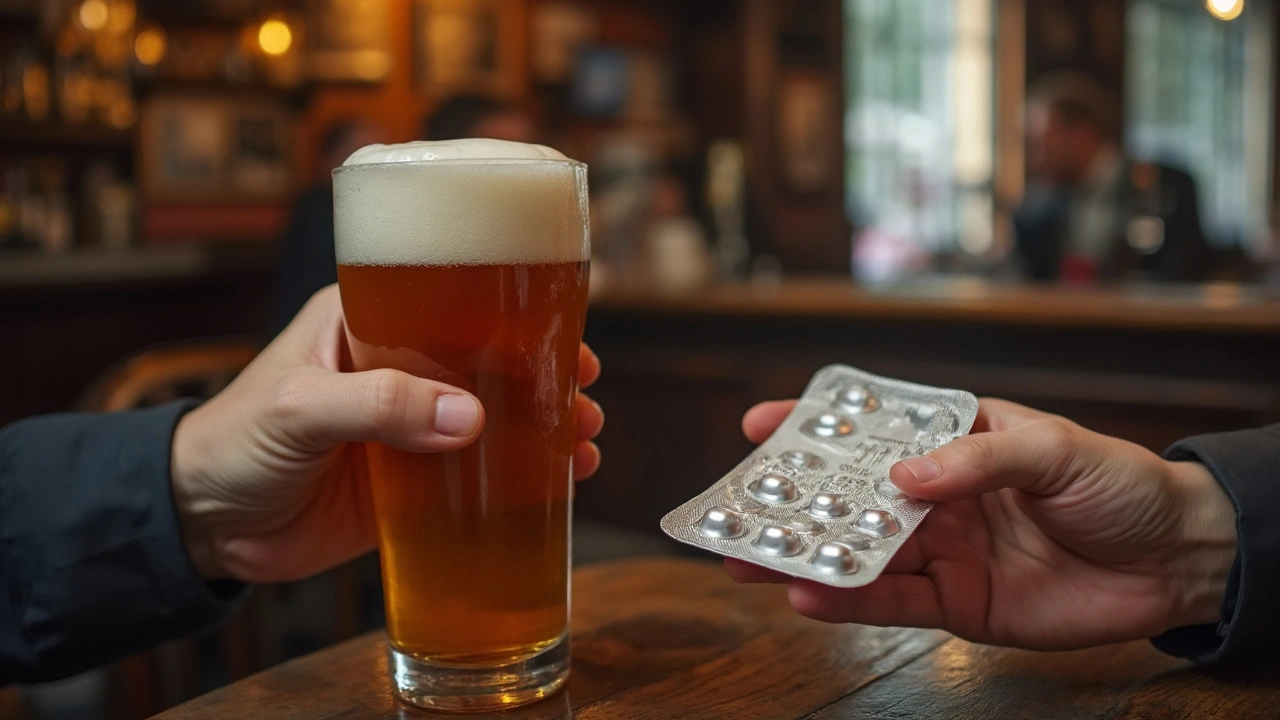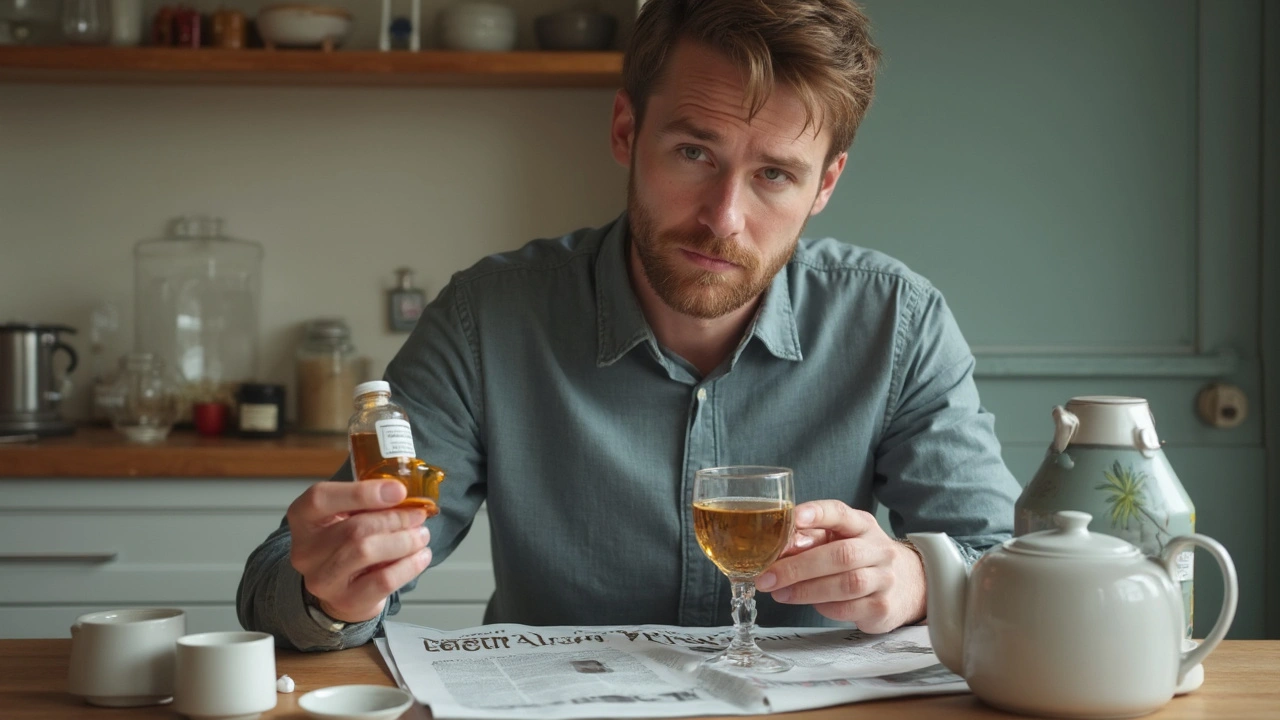“Never mix your meds and wine!” “Beer will ruin your stomach if you’re on a PPI!” If you spend just five minutes on any health forum or binge-watch YouTube health hacks, the drama around mixing alcohol and proton pump inhibitors (PPIs) — like omeprazole or lansoprazole — pops up everywhere. Some folks act like even a single drink will send you straight to the ER. The truth? Science paints a different picture. Most warnings come from hearsay and confusion, not hard facts. Ready to push past the noise and see what’s real about alcohol, PPIs, and what actually happens in your stomach? Let’s get into the heart of it.
PPIs: What They Actually Do to Your Body
Proton pump inhibitors are among the top 10 most commonly prescribed drugs worldwide. They’re famous — or infamous — for their role in fighting heartburn, acid reflux, GERD, and healing stomach ulcers. Omeprazole, lansoprazole, pantoprazole, and their cousins all work about the same way: they switch off the acid pumps in your stomach lining. No, they don’t literally “turn them off with a switch,” but by blocking the proton pump enzyme called H+/K+ ATPase, they slash how much acid you produce — dropping stomach acidity to surprisingly low levels. That’s usually what you want if your stomach’s becoming its own chemistry project gone wrong.
Most people starting on a PPI get hit by a jumble of possible side effects from the pharmacy leaflet. Headache, diarrhea, constipation, and abdominal pain are classics. Longer-term users might hear whispers about kidney issues, infections like C. diff, or weaker bones. Not everyone gets these; some never do. But whatever else is going on, the main point of PPIs is clear — less acid equals less pain, less burning, and a chance for any sores or ulcers to heal.
Here’s a mind-bending fact: the stomach in people on PPIs can reach a pH as high as 6, which is a long way from the “battery acid” normal of pH 1-2. Why does that matter? First, it drastically reduces the corrosive environment that leads to ulcers and heartburn. Second, it might change the way other things — like food or, yes, alcohol — behave when they hit your gut. Some folks think alcohol turns nasty when you take a PPI, but let’s look at whether that’s true or just another myth.
Alcohol Myths: The Biggest Misconceptions About Mixing with PPIs
Nothing fires up people’s health anxiety like seeing two so-called “bad” things on the same table — meds and booze. When it comes to alcohol and PPIs, myths have roots everywhere: your neighbor’s story, an internet comment, maybe even an over-cautious pharmacist. Here are the top whoppers that float around:
- Alcohol “cancels out” omeprazole, making it totally useless.
- Drinking while on a PPI will trigger instant, violent stomach reactions.
- Mixing both causes liver damage right away.
- You’ll get drunk faster or stay intoxicated longer using PPIs.
- Alcohol + PPI combo creates a stronger risk for cancer or major illness.
What does actual science say? First, PPIs like omeprazole and lansoprazole do NOT directly interact with alcohol in your bloodstream. The European Medicines Agency, FDA, and UK NHS all agree: there’s no chemical “collision” that makes alcohol more toxic or the PPI less effective. Omeprazole is mostly processed in the liver, just like alcohol, but through different pathways. Studies with people taking normal doses found that omeprazole didn’t change blood alcohol levels or the way the liver broke down booze. You notice no ‘supercharged’ hangover, and you won’t suddenly become more drunk than usual.
The most stubborn myth is that alcohol somehow overcomes the effect of a PPI, making your stomach go wild with acid. But omeprazole and similar drugs keep suppressing stomach acid production, even if your evening included wine, beer, or shots. Some research even hints that alcohol — especially wine — can slightly boost acid production, but nothing dramatic enough to undo a PPI’s effect. The only time problems surface is when you drink to excess, which is rough on your body whether or not you’re on stomach meds.
On the cancer front, large-scale studies show no link between simply having a drink and getting sick from taking a PPI. Of course, heavy long-term drinking increases your risk of multiple health problems, but the PPI itself doesn’t speed that up or create new dangers specifically. Let’s kick out the idea that a single glass of wine is lurking like a health time-bomb for PPI users. It just isn’t so.

Real, Proven Risks: What Science Says About Actual Dangers
Okay, so there’s no explosive chemical reaction. But are there any real-life risks to this combo? Yes, but they’re more practical than most people imagine — and not as dramatic as you’d fear. Here’s the lowdown on genuine issues proven in clinical trials and hospital records:
- Stomach Lining Irritation: Alcohol, especially in high amounts, is tough on tissues. Chronic inflammation or direct contact with ulcers can slow healing. Even with PPIs protecting your stomach, getting blackout drunk can undo some of the medicine’s good work.
- Reduced Symptom Relief: If you’re using a PPI for severe acid reflux, drinking alcohol (especially at night) can relax your esophageal sphincter and encourage reflux. So, you might feel more heartburn, even though your stomach is making less acid overall.
- Compromised Healing: For people with existing gastrointestinal injuries — ulcers, erosions, Barrett’s esophagus — heavy drinking interferes with recovery. It’s not the PPI and alcohol teaming up, but alcohol working against your body’s attempts to mend itself.
- Liver Overload in Rare Cases: People with underlying liver disease need to tread carefully. Both omeprazole and booze use liver processing power, so in those with cirrhosis or alcoholic liver disease, the combination might cause slower breakdown of both, leading to side effects (though very rarely in healthy adults).
One respected article on omeprazole alcohol interaction lays out these findings clearly: for most healthy adults, the main issues are indirect. You might get more reflux symptoms, or slow your recovery from actual stomach wounds, but you won’t experience new, dangerous chemical side effects from responsible drinking.
A quick tip? If you find that one type of alcohol consistently flares your symptoms (say, red wine or whiskey), skip it. Not all drinks are created equal for sensitive guts. And always space out your PPI dose; no need to wash down omeprazole with a cocktail — just basic timing goes a long way.
Here’s a quote from Dr. Amy Fox, a gastroenterologist, that sums it up:
“For patients with common acid reflux, moderate drinking alongside a PPI is safe. The combination doesn’t cause any special health risk for most people, but listening to your body and keeping alcohol reasonable is always smart.”
Notice that “moderate” is the keyword. A glass or two, not a night you’ll regret and barely remember.
Smart Guidelines: Tips for Staying Safe While Using PPIs and Drinking
Here’s where we get practical. If your doctor says a PPI is needed and you also want to enjoy a drink sometimes, is there a sweet spot? Absolutely. These tips can help you keep side effects at bay and still have a perfectly normal nightlife (or date night, or weekend barbecue):
- Stay under the “binge” threshold: Official guidelines call “binge” drinking more than 4-5 drinks in a night (for men) or 3-4 (for women). Stay well below this if you’re treating acid reflux or ulcers.
- Track your symptoms: Keep a simple log on your phone if you’re curious — what you drank, when, and whether your stomach feels better, worse, or totally unaffected. Patterns jump out fast.
- Eat before you drink: Never drink on an empty stomach if you’re fighting digestive issues. Just a small meal or snack can cut down on direct irritation and curb reflux.
- Separate your doses: Take your PPI first thing in the morning (as most directions say), then wait a few hours before drinking. This avoids washing your medication down with booze, which just feels wrong anyway.
- Practice self-awareness: If you’re healing from more serious injuries (ulcers, erosions, Barrett’s), talk to your doctor before adding any alcohol, just in case. Some folks need to dry out completely while the gut heals.
- Hydrate and pace yourself: Water is the under-appreciated hero here. Swap every other drink for water and go slower; it reduces both stomach upset and hangover risk.
Some people love lists, so here’s a short one: what NOT to do when pairing PPIs and alcohol:
- Don’t double your dose “just in case” you plan to drink — not only is this ineffective, it can add new side effects.
- Don’t experiment with unknown supplements or herbal remedies alongside this combo. Stick to what your doctor recommends.
- Don’t ignore warning signs: severe pain, black/tarry stools, vomiting blood, or intense nausea deserve fast medical attention, regardless of what combo you took.
The last word? If you’re using omeprazole or any other proton pump inhibitor, and want to have an occasional drink, you’re not risking your life or undoing the benefits of your medicine. The modern science is clear — your main job is to keep moderation in mind and be real about your body’s feedback. That’s it. Myths busted, worries eased, and no more panic when someone offers you a drink at dinner.


Post A Comment